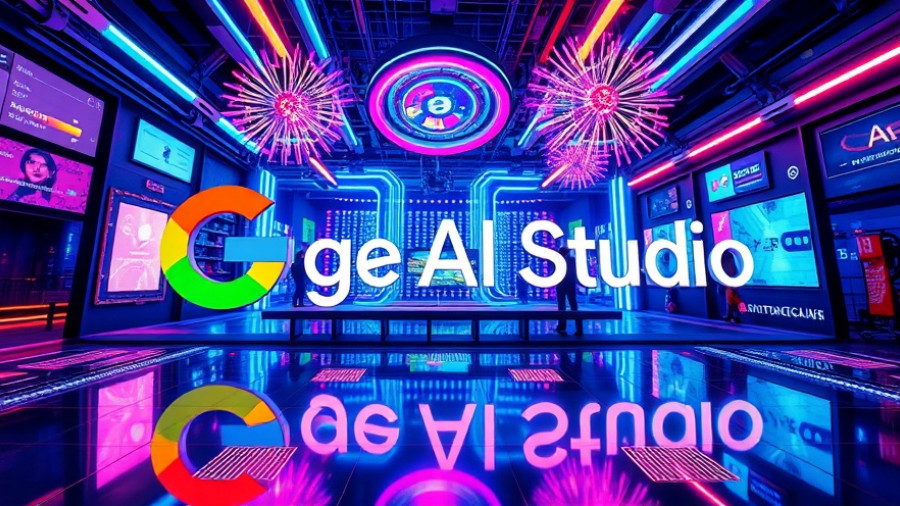
The Shift Towards Paid Advertising: A Reality Check
In recent months, the digital marketing landscape has seen a tumultuous shift. OpenAI, the brand synonymous with cutting-edge artificial intelligence, claimed a commitment to ad-free experiences. However, the recent revelation of their involvement in paid advertising has raised eyebrows. This pivot not only raises questions about transparency but also reflects a broader trend where platforms are increasingly relying on ad revenue to fund their operations. Understanding this trend is essential for professionals, business owners, and marketers navigating the evolving digital economy.
In 'OpenAI Said No Ads. They Lied!', the discussion dives into the unexpected shift in OpenAI's advertising strategy, prompting deeper analysis on our end.
What Lies Beneath OpenAI's Marketing Strategies?
The initial assertion from OpenAI illustrated a vision of creating a platform free from the distractions of ads, aligning with a user-centric approach that many AI enthusiasts celebrated. It promised an environment where quality content takes precedence, thereby enhancing user experience. However, the recent advertisements present a stark contrast, showcasing a marketing strategy that leans heavily on monetization through PPC and other ad models.
This steers the conversation toward the need for authenticity in brand communications. Can businesses truly trust brands that pivot on major promises? The longstanding relationship between transparency and user trust is paramount, especially in the digital marketing domain.
Navigating the New Marketing Landscape: Opportunities and Challenges
As advertising increasingly infiltrates platforms previously touted as ad-free, professionals must adapt their marketing strategies. Marketers should consider fostering consumer empathy and engagement rather than just pushing an ad agenda. The move towards paid advertising can also be a sign for businesses to hone their inbound marketing strategies—focusing on organic growth through content that resonates with their audience.
Additionally, the presence of ads on such platforms underlines the importance of leveraging SEO tools and analytics. For business owners, this opens avenues to invest in tailored advertising campaigns that can yield higher conversion rates, given the right targeting and analytics backing them.
Insights from Industry Experts: What Should You Do?
Industry experts like Neil Patel advocate for understanding your audience deeply and customizing marketing efforts accordingly. From data-driven marketing strategies to leveraging SEO best practices, professionals today have the tools at their fingertips to outperform competitors who may fall prey to generic advertising tactics.
Below are key steps you can take in this turbulent environment:
- Focus on Content Creation: Prioritize relatable, high-quality content that genuinely engages your audience, rather than falling solely for paid advertising.
- Optimize Your Website: Leverage SEO techniques to enhance your website's performance and visibility, which can help reduce reliance on paid ads.
- Understand Your Customer's Journey: Mapping out customer interactions provides valuable insights into how to better connect with potential consumers.
- Incorporate Marketing Technologies: Utilize CRM and marketing automation tools to streamline your processes and improve customer experiences.
The Future of Digital Ads and Marketing Strategies
While the landscape may be shifting towards increased advertising, it also presents opportunities for innovation. The integration of AI and machine learning in marketing provides promising avenues for personalized and targeted experiences for customers. As businesses explore the intersection of technology and marketing, investments in digital skills through courses and workshops become crucial.
Remember to maintain flexibility as well. The trends in social media marketing, e-commerce, and beyond indicate a future where adaptability will be key to sustaining growth and brand loyalty. Marketers should be prepared to pivot and test marketing strategies that align with customer preferences.
Conclusion: Time to Reassess Your Marketing Strategy
As OpenAI’s bold moves illustrate, the digital marketing landscape is in constant flux. Business owners and marketers need to reassess their strategies, focusing on authenticity, precision, and adaptability. Engaging with your audience through relevant content, utilizing SEO, and data analytics tools are not merely strategies but necessities in today’s market.
For those ready to embrace the diverse marketing tools available, there is potential for growth, customer engagement, and effective brand building. Engage with experts, invest in learning, and stay ahead of the curve through innovative strategies that resonate with your audience.
Are you ready to refine your marketing strategy in light of these changing dynamics? Start exploring new content marketing techniques, and don’t shy away from leveraging analytics as you shape your brand’s future.
 Add Row
Add Row  Add
Add 




Write A Comment